How 12 Years of Universal Book Gifting Has Impacted Children in Scotland
Katherine Wilkinson and Catriona Wallace
At Scottish Book Trust, we believe that books, reading and writing have the power to change lives.
A love of reading inspires creativity, improves employment opportunities, mental health and wellbeing, and is one of the most effective ways to help break the poverty cycle.
A hugely important part of our work is our book gifting programmes, which aim to support families to play, read and learn together, fostering the bonding opportunities and the love of reading that are so vital to children’s life chances.
Bookbug has been operating since 2010 and currently gifts book bags to all children in Scotland at four stages – at birth, at age 1–2, at age 3–4 and in Primary 1 at school (age 5). Each bag contains three books and a range of other fun resources to support families to sing, rhyme and read together, as well as crayons, pencils and paper for mark making, supporting early writing development.
Read Write Count with the First Minster has been operating since 2016 and currently gifts book bags to all children in Scotland at two stages – in Primary 2 (age 6–7) and in Primary 3 (age 7–8). Each bag contains two books and a range of activities to support families to do fun reading, writing and numeracy activities with their children.
Together, the two programmes are the largest nationwide universal book gifting offer in the world, with over 10 million books having been gifted between them since 2010.
As important as the reach of the programmes is the high quality of the books provided. The books in all six bags change annually, and once a year we invite publishers to submit titles for the new bags. We have selection criteria to ensure that we get the most engaging, visually appealing books that we hope children will love. We want to spark joy with our books and start a lifelong love of reading for pleasure.
We think carefully about representation at every stage of our book selection process:
- We invite diverse panels of independent experts to help us select books that are age and stage appropriate, as well as being contemporary, fun, particularly suited to family reading and home learning, and representative of a wealth of different characters and experiences.
- We involve children and value children’s voices (including infants) in the process.
- It is important to us that families see images and videos of real families in our support materials that show that book sharing is for them.
- We showcase a wide range of authors and illustrators. We promote contemporary Scottish picture-book makers alongside international authors and illustrators.
- We promote a wide range of books through book lists and recommendations to help families discover new things.
Within the books in each bag, some characters and experiences will be relatable, others will offer insight on another world. Such is the beauty of picture books! For example, one book our panel was delighted to include in the Bookbug toddler bag this year is Puddling by Emma Perry and Claire Alexander. They particularly chose it for the representation of urban life and families who live in high-rise flats … and the authentic and relatable experience of rainy Scottish weather!
For a wee insight into the experience of being on a panel you can read an article by author Ross MacKay, one of our panel members in 2023, at https://www.scottishbooktrust.com/articles/choosing-the-bookbug-books.
There is a wide body of research showing the immense impact of shared reading, reading for pleasure and book ownership. The impacts range from improved communication skills, vocabulary and attainment at school, through to closer family bonds, increased empathy, improved mental wellbeing and self-esteem, and greater resilience in the face of difficulties.
Bookbug and Read Write Count with the First Minister are unique in their scale, reach and longevity, providing the opportunity for positive messaging around shared reading and books to be repeatedly emphasised to children and families over the first eight years of a child’s life. Whilst annual evaluations are conducted for both programmes, we wanted to carry out research investigating the cumulative impact of the two programmes for children and families in Scotland, and to find out to what extent the programmes are supporting children and families to access the broad range of benefits of shared reading suggested by the research detailed above.
We decided on three main research methods. We firstly carried out a national omnibus survey of 1,000 parents/carers of 8–12 year olds in Scotland (the group of children who should have received all six book bags from birth to Primary 3). This omnibus survey gathered the views of parents/carers who would not likely be reached by direct communications from Scottish Book Trust, and surveyed parents/carers from a breadth of geographic locations and demographic groups.
We also created an online survey gathering memories and feedback around the book bags from both parents/carers and professionals (health visitors, Early Years professionals, learning professionals and others involved in working with children). There was also a postcard version of this survey distributed through libraries to capture the views of those who may not have had the digital access and/or skills to complete an online survey. This survey gathered a wealth of qualitative data, with 200 detailed responses received. This data added depth to the quantitative data and allowed for exploration of enabling factors and areas for development.
Most importantly, we also spoke to children. Children’s voices are traditionally under-represented in research, and we were keen to include the views of children who had received the bags, especially in the context of the incorporation of the United Nation’s Convention on the Rights of the Child into Scottish law. Including their voices emphasised the centrality of their experiences to the development (or otherwise) of any impact, and helped us to see a truer picture of the effect the book gifting had had on them. To gather children’s views, we ran comic workshops with 8–12 year olds in four schools, chosen to represent a range of demographics. These workshops were facilitated by Paul Bristow, a brilliant comic-book artist with many years’ experience working in schools. We were amazed by how well the children remembered the books they had received, with many drawing detailed versions of the covers from memory!
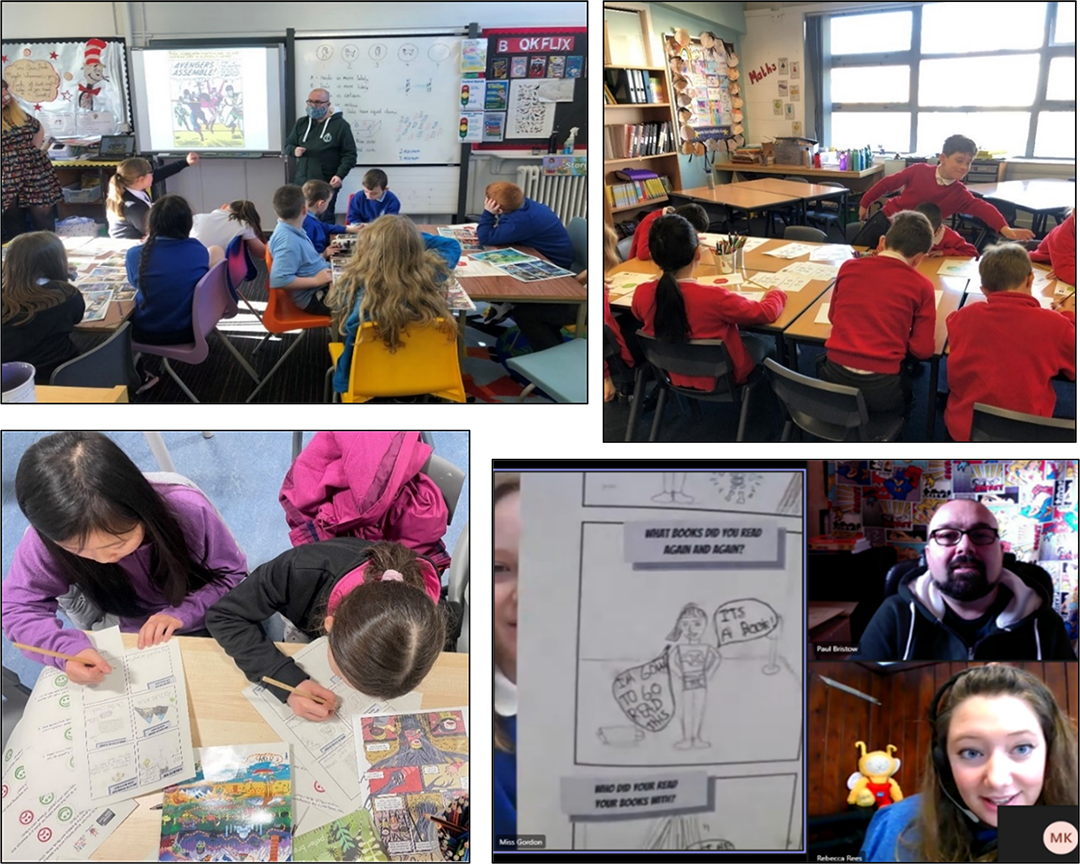
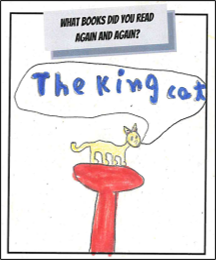
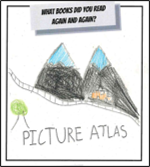
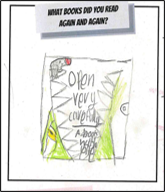
Among the findings was the importance of the book bags to families from areas of multiple deprivation. 84% parents/carers told us the book bags encouraged them to read books together earlier than they would have otherwise. This was high across the Scottish Index of Multiple Deprivation, with those living in the most deprived 20% of the country being more likely to say this. One told us, ‘I have never been a reader, it wasn’t shown to me at a young age, we never had anything like Bookbug so I never read much unless it was necessary for school work. So honestly without being gifted the bags and seeing how much the children benefit from reading (and how much they enjoy it) I probably wouldn’t have as much books in the house and wouldn’t do as much reading with both my children as I do now.’
Another parent said they remembered their ‘kids being really happy to receive them. I don’t have much money so it is good for them to have an unexpected treat’.
Learning professionals echoed this, with one saying, ‘one refugee family were so delighted, they had nothing, but this has meant their boys had books’.
79% of parents/carers also reported that the book bags encouraged them to visit the library more often, further bolstering their family’s access to quality books and, potentially, community groups, events and support, such as Bookbug sessions.
Parents/carers, professionals and children all reported important impacts on communication and literacy skills. However, the strongest feelings were reserved for the impact the book gifting had on relationships and wellbeing. 87% of parents/carers agreed that the book bags helped them to bond with their children with one telling us, ‘we always try to make time to read but recently as a single parent of two kids we have been missing it quite often. After my son received his Bookbug bag from school it has got us back into the habit of setting aside five or ten minutes before bed to read, it’s a great bonding time and brings us closer together as a family’.
Parents/carers and children also talked about the sense of relaxation and safety they felt when reading the books together; one parent said, ‘[I remember being] in my eldest daughter’s bedroom, sitting on a chair with both girls beside me before I had to head back off to work away from home. Both girls wanted another story, but it certainly felt like memories were being made and a sense of calm in what is a busy and scary world outside’.
Children in the workshops drew pictures of themselves enjoying reading with family members and in comfortable and relaxing surroundings:
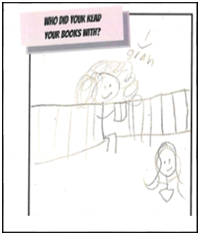
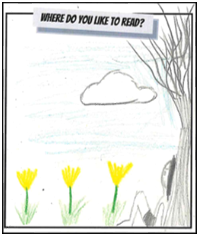
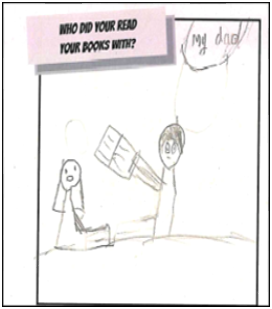
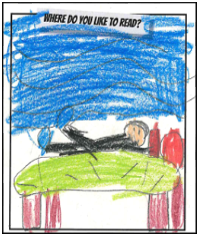
We also received a number of beautiful stories from families about how the books had supported them through difficult times; one parent told us, ‘I had postpartum depression symptoms when my daughter was born in the first lockdown of 2020. The book What a Wonderful World came as a saviour to us in our darkest of times. My husband and I started to read the book every night to our baby girl. Then we began to sing the song to calm our fussy baby. Gradually, we started to see the bright blessed day and the dark sacred night. The words of the book made us realise the importance of the wonders of the world which we took for granted’.
The research identified three factors key to the impact:
- The inclusion of high-quality, fun books in the book bags. Many parents/carers commented that the book bags introduced them to new titles or genres that have since become favourites of their children. The selection of contemporary books by an independent panel of experts ensures that the books cover a range of themes and interests, represent diverse families and experiences, and are age and stage appropriate, supporting children’s development and promoting a love of reading. One parent/carer said, ‘overall our experience with the bags has been extremely positive and overall the programme is one that is hugely important for early literacy. I also like that diversity of characters is apparent in the books chosen and this is something that should be continued going forward so all children can see themselves represented in literature’.
- Universal gifting, which creates excitement and a shared culture of reading for pleasure across Scotland; one parent/carer said, ‘what I have liked especially is that the whole generation of children have shared them, when they play the stories from them they all know them’.
- Professionals providing families with information about the book bags at the point of gifting. This is key to creating the excitement shown to be so important to the book bags’ impact, and supports parents/carers to use the book bags at home with their children, deepening that impact.
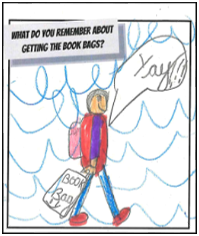
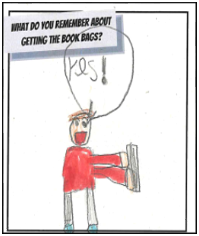
Ultimately, our research into the impact of book gifting in Scotland showed us that Bookbug and Read Write Count with the First Minister are hugely valued by families and professionals from across the breadth of Scotland and a variety of backgrounds. They provide the access to books we know is so vital in giving children the best start in life, and also showcase a breadth of characters, allowing children to both see themselves in the books, and to learn about cultures and experiences other than their own. One parent/carer summed up their feelings, ‘I think the bags are fantastic … We have a lot of the Bookbug books we’ve managed to get second hand as well as those we’ve been gifted in the bags (from our baby bag the books are in tatters!!). All the books are so well chosen there’s never been one we haven’t liked. Thank you so much for all you do’.
Websites
Bookbug – https://www.scottishbooktrust.com/bookbug.
Read Write Count with the First Minister – https://www.scottishbooktrust.com/reading-and-stories/about-read-write-count.
The book gifting impact study – https://www.scottishbooktrust.com/our-research/the-impact-of-book-gifting-in-scotland.
Katherine Wilkinson is the Head of Research & Evaluation at Scottish Book Trust. She oversees all of Scottish Book Trust’s R&E work, including programme evaluation, research in partnership with universities, and original research conducted in house. She is passionate about using research and evaluation evidence to ensure that Scottish Book Trust’s work supports people across the whole of Scotland to develop a lifelong love of reading and access all the benefits this brings.
Catriona Wallace is Head of Early Years at Scottish Book Trust and oversees the entire Bookbug programme. She has a particular love of picture books which led her from working in publishing to Scottish Book Trust. Catriona is passionate about giving children the best possible start by supporting families to use stories, songs and rhymes. When she is not managing the Bookbug programme, she loves learning new things through the eyes of her two young children.
